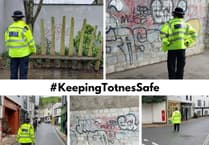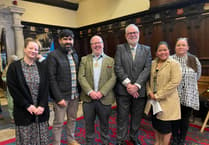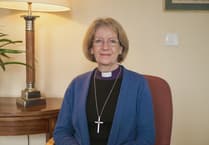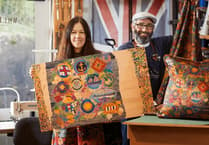A CIVIL servant has become the first civilian to take part in the Royal Navy’s junior officer’s leadership course at the Britannia Royal Naval College, Dartmouth.
Richard Hoare, the nuclear services support manager at Devonport Naval Base in Plymouth, joined a class of 18 naval officers ranked at Lieutenant and Royal Marines Captains, for the two-week course delivered by the Royal Navy Leadership Academy.
Richard joined the Ministry of Defence in 1997 as an apprentice and has risen to become a B2 grade. He is one of four people selected to take part in the Devonport pilot leadership and development programme. The pilot has been designed for nominated senior business managers with leadership potential who are prepared to take on new challenges to further their career development.
The course is designed to give the students a broader understanding of leadership in a range of situations to help individuals develop their own styles. The first week was a combination of lectures, debates and student presentations. The students were also tested physically including a session on BRNC’s high ropes training facility, which stands 13 metres high.
Richard said: ‘The Dartmouth high ropes ice-breaker challenge on day one was excellent. This really helped the team to gel and enhance the following two weeks. As a team leader in Devonport, managing a skills shortage and high age profile, the session on coaching was superb and has been instantly transferable back to my own work-place working with new recruits.
‘Most aspects of the course were a bit of theory then straight into role play or discussions groups with feedback sessions to reinforce the message.’
Week two saw Richard and his fellow students transferred to the outdoor leadership training centre in the Brecon Beacons for a two day exercise in the Welsh mountains.
Richard added: ‘The physical side of the course was extremely enjoyable, but at the same time reinforced the theoretical aspects of leadership styles learned in week one.
‘Crossing the Brecon Beacons on foot and by bicycle in somewhat arduous conditions allowed us all to demonstrate our leadership styles. We were also required to coach each other on a range of different navigational skills. Setting off at 8.30am when everyone was upbeat and enthused, it’s quite easy to lead the team.
‘Contrast that to 3pm the same day, the team are cold, wet, tired and hungry and that was when our leadership skills were tested a little more.’
By the end of the course Richard could see the benefit of the training for other civil servants.
He said: ‘Based on my experience, I think civilians would get significant benefit from this training. I learned a lot about myself. The course was a real boost to my emotional intelligence and has really helped me think about how I interact with others.
‘My presence also allowed a debate on the differences between civilian and military styles and perspectives. Although there were some differences mainly due to command and hierarchical structure in the military, our experiences and views of what constitutes a good leader was very similar.’
Captain Henry Duffy, the Commanding Officer of BRNC, said: ‘The RNLA is the centre of excellence for all command, leadership and management training within the Royal Navy. The academy is split into three squadrons, two of which are based here at BRNC, alongside the headquarters, and the other is at HMS Collingwood. We were delighted to be able to share our training with Mr Hoare and pleased that he found the course not only of use to him, but that he also saw the potential for others in the civil service to benefit should we have spare capacity.’




